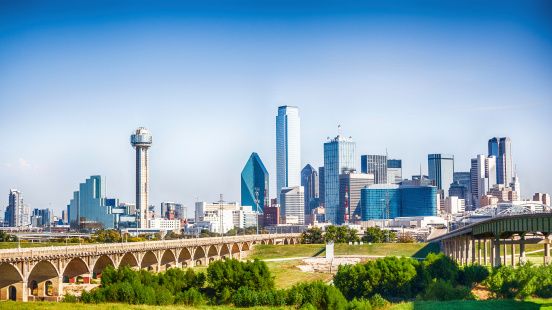 Dallas’ downtown is in the midst of a renaissance. On the day of the shooting, the real estate columnist for the Dallas Morning News noted that since 2001, “Thousands of new apartments, plus restaurants, shops, parks and increased transit connections, have made Dallas’ core a more exciting urban environment.” The story credited city officials for billions of investment in parks, bridges, and facilities, and noted that private developers followed by pumping millions of upgrades into the city’s skyscrapers.
Dallas’ downtown is in the midst of a renaissance. On the day of the shooting, the real estate columnist for the Dallas Morning News noted that since 2001, “Thousands of new apartments, plus restaurants, shops, parks and increased transit connections, have made Dallas’ core a more exciting urban environment.” The story credited city officials for billions of investment in parks, bridges, and facilities, and noted that private developers followed by pumping millions of upgrades into the city’s skyscrapers.
The day after the incident, many downtown businesses shuttered for a few days and asked employees to stay home. Bank of America sent out a statement assuring employees that counseling would be available. Karen Katz, CEO of Neiman Marcus, headquartered in the city, issued her own statement: “The tragic news the city of Dallas has woken up to has affected us deeply. Our thoughts and prayers go out to the families of the five officers killed in the line of duty and the many more injured.”
Both Southwest Airlines and American Airlines offered free travel to victims’ families, a common practice in the airline industry. Southwest reported it would provide free air travel to about 500 people following the shooting.
But urban leaders expressed confidence that the shooting would not derail plans for downtown. “It’s a horrific event,” John Crawford, CEO of Downtown Dallas, Inc., told the Dallas Morning News. “Will [people] pause and think about it [before planning a trip to Dallas]? Probably. But at the end of the day, we won’t have major conventions changing plans to come to Dallas.”
In fact, he told Chief Executive, “Downtown Dallas is being revitalized and major redevelopment efforts are underway. We have a lot of momentum and feel that we are poised to stay on track and move forward.”
As the media descended on Dallas in the hours after the shooting, mayor Mike Rawlings—formerly the CEO of Pizza Hut—urged the nation to “come together, lock arms, and heal the wounds that we all feel from time to time. Words matter, leadership matters at this time. I’m proud of our chief.”
In subsequent interviews, Rawlings asserted that Dallas had the fewest police officer-related shootings of any large city in America this year. Indeed, Rawlings and Dallas police chief David Brown have been credited with reducing crime and improving police-community relations in recent years. In 2015, the murder rate was at its lowest since 1930, and complaints against police have dropped dramatically.
Austin-based author Richard Parker urged the national media to avoid stereotyping the city: “For now, [Dallas] will have to endure being cast—against its spirit and all the evidence—as a kind of national poster child for tragedy instead of for urban renaissance or community policing,” Parker wrote in The Atlantic magazine. “But if reflection has any bearing on truth, Dallas will prevail.”

Chief Executive Group exists to improve the performance of U.S. CEOs, senior executives and public-company directors, helping you grow your companies, build your communities and strengthen society. Learn more at chiefexecutivegroup.com.
0

1:00 - 5:00 pm
Over 70% of Executives Surveyed Agree: Many Strategic Planning Efforts Lack Systematic Approach Tips for Enhancing Your Strategic Planning Process
Executives expressed frustration with their current strategic planning process. Issues include:
Steve Rutan and Denise Harrison have put together an afternoon workshop that will provide the tools you need to address these concerns. They have worked with hundreds of executives to develop a systematic approach that will enable your team to make better decisions during strategic planning. Steve and Denise will walk you through exercises for prioritizing your lists and steps that will reset and reinvigorate your process. This will be a hands-on workshop that will enable you to think about your business as you use the tools that are being presented. If you are ready for a Strategic Planning tune-up, select this workshop in your registration form. The additional fee of $695 will be added to your total.

2:00 - 5:00 pm
Female leaders face the same issues all leaders do, but they often face additional challenges too. In this peer session, we will facilitate a discussion of best practices and how to overcome common barriers to help women leaders be more effective within and outside their organizations.
Limited space available.

10:30 - 5:00 pm
General’s Retreat at Hermitage Golf Course
Sponsored by UBS
General’s Retreat, built in 1986 with architect Gary Roger Baird, has been voted the “Best Golf Course in Nashville” and is a “must play” when visiting the Nashville, Tennessee area. With the beautiful setting along the Cumberland River, golfers of all capabilities will thoroughly enjoy the golf, scenery and hospitality.
The golf outing fee includes transportation to and from the hotel, greens/cart fees, use of practice facilities, and boxed lunch. The bus will leave the hotel at 10:30 am for a noon shotgun start and return to the hotel after the cocktail reception following the completion of the round.